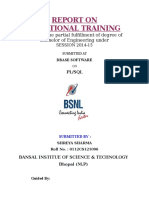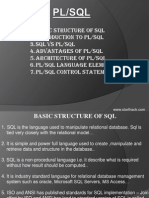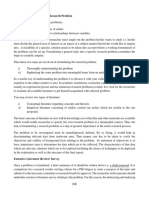Syllabus - Oracle 10g Program With PLSQL
Uploaded by
Afif Kamal FiskaSyllabus - Oracle 10g Program With PLSQL
Uploaded by
Afif Kamal FiskaORACLE DATABASE 10g: PROGRAM WITH PL/SQL
COURSE OVERVIEW
This class introduces participants to PL/SQL and helps them understand the benefits of this powerful
programming language. In the class, participants learn to create PL/SQL blocks of application code that
can be shared by multiple forms, reports, and data management applications. Participants learn to
create procedures, functions, packages, and database triggers. Participants use iSQL*Plus to develop
these program units. Participants also learn to manage PL/SQL program units and database triggers, to
manage dependencies, to manipulate large objects, and to use some of the Oracle-supplied package.
Duration: 30 hours
WHO SHOULD ATTEND
PREREQUISITES
This course is valuable for PL/SQL Developer, Database
Designers, Forms Developer, or Technical Consultant
Oracle 10g: Introduction to SQL
or equivalent knowledge.
COURSE CONTENT
INTRODUCTION TO PL/SQL
HANDLING EXCEPTIONS
Benefits of PL/SQL Overview of the
Types of PL/SQL blocks
Predefined Exceptions Propagate
Exceptions Use The
RAISE_APPLICATION_ERROR
Procedure
DECLARING PL/SQL IDENTIFIERS
Identify the Different Types of
Identifiers List the Uses for
Variables Declare PL/SQL Variables
WRITING EXECUTABLE
STATEMENTS
Basic Block Syntax Guidelines Use
Operators in PL/SQL
INTERACTING WITH THE ORACLE
SERVER
Include SELECT Statements in
PL/SQL Manipulate Data in the
Server Using PL/SQL The SQL
Cursor concept
WRITING CONTROL STRUCTURES
Conditional processing Using IF &
CASE Statements Use Iterative
Control with Looping Statements
WORKING WITH COMPOSITE
DATA TYPES
CREATING STORED PROCEDURES
Use the NOCOPY, PARALLEL
ENABLE hint Use the
AUTONOMOUS TRANSACTION
pragma Set the AUTHID directive
Differentiate between formal and actual MANAGING DEPENDENCIES
Describe dependent and referenced
parameters Parameter modes
objects Track procedural dependencies
CREATING STORED FUNCTIONS
with dictionary views Manage local and
List the CREATE OR REPLACE
remote procedural dependencies
FUNCTION syntax Using stored
MANIPULATING LARGE OBJECTS
functions in SQL statements
Create and maintain LOB data types
CREATING PACKAGES
Use the DBMS_LOB PL/SQL package to
List the benefits or using PL/SQL
control LOBs
packages Create & Remove packages
CREATING TRIGGERS
USING MORE PACKAGE CONCEPTS Describe different types of triggers
Overload definitions Use forward
declarations Create a one-time
package initialization block Wrap
code to hide the source
Create database triggers Describe
database trigger firing rules Remove
database triggers
UTILIZING ORACLE SUPPLIED
PACKAGES
Create database and system event
triggers Create triggers on DDL
statements Explain the rules for reading
and writing to tables with triggers
Manage trigger code
Learn the Composite Data Types of
PL/SQL Records and Tables
Inserting and Updating with PL/SQL
Records Use INDEX BY Tables
Describe & use how
DBMS_OUTPUT, UTL_FILE, HTP,
UTL_MAIL, DBMS_SCHEDULER
package to schedule PL/SQL code to
run
USING EXPLICIT CURSORS
DYNAMIC SQL AND METADATA
Cursor FOR Loops Use the FOR
UPDATE Clause to Lock Rows Use
the WHERE CURRENT Clause to
Reference the Current Row
DESIGN CONSIDERATIONS FOR
PL/SQL CODE
Write dynamic SQL using the
EXECUTE IMMEDIATE syntax &
with the DBMS_SQL package
Generate DDL from metadata using the
DBMS_METADATA package
SUGGESTED NEXT COURSE
Oracle Forms Developer 10g: Build Internet Applications
Oracle Reports Developer 10g: Build Reports
Oracle Database 10g: Administration Workshop I
APPLICATIONS FOR TRIGGERS
UNDERSTANDING AND INFLUENCING
THE PL/SQL COMPILER
Describe native compilation and
interpreted compilation Explain the
compiler warning mechanism Use
DBMS_WARNING to implement
compiler warnings
CERTIFICATION
This course is designed to prepare you
for the corresponding Oracle Certified
Associate exam.
You might also like
- Oracle Database 19c: PL/SQL Workshop: Student Guide D108650GC10100% (1)Oracle Database 19c: PL/SQL Workshop: Student Guide D108650GC1024 pages
- CADKEY Advanced Design Language (CADL) GuideNo ratings yetCADKEY Advanced Design Language (CADL) Guide231 pages
- Diploma in Information Technology Dit 311 - Relational Database Management System Learning Outcomes and Assessment RequirementsNo ratings yetDiploma in Information Technology Dit 311 - Relational Database Management System Learning Outcomes and Assessment Requirements7 pages
- Oracle Database 10g: PL/SQL Fundamentals Duration: 2 Days DescriptionNo ratings yetOracle Database 10g: PL/SQL Fundamentals Duration: 2 Days Description3 pages
- (XXXX) Syllabus - Exam Oracle Database 11g Program With PLSQL #1Z0-144 by Arief 050614 EditedNo ratings yet(XXXX) Syllabus - Exam Oracle Database 11g Program With PLSQL #1Z0-144 by Arief 050614 Edited1 page
- Modi - Introduction To Oracle9i - PLSQL Parte 2 y Solucion PracticeNo ratings yetModi - Introduction To Oracle9i - PLSQL Parte 2 y Solucion Practice392 pages
- Oracle Application Express Developer (APEX)No ratings yetOracle Application Express Developer (APEX)11 pages
- Oracle Database 10g: Advanced PL/SQL Duration: 2 Days DescriptionNo ratings yetOracle Database 10g: Advanced PL/SQL Duration: 2 Days Description3 pages
- Report On Vocational Training: Towards The Partial Fulfillment of Degree of Bachelor of Engineering UnderNo ratings yetReport On Vocational Training: Towards The Partial Fulfillment of Degree of Bachelor of Engineering Under30 pages
- Oracle Database 11g: Advanced PL/SQL: D52601GC10 Edition 1.0 March 2008 D54299No ratings yetOracle Database 11g: Advanced PL/SQL: D52601GC10 Edition 1.0 March 2008 D5429914 pages
- Oracle PL SQL by Example Benjamin RosenzweigNo ratings yetOracle PL SQL by Example Benjamin Rosenzweig65 pages
- PL/SQL User's Guide and Reference: Release 2.3No ratings yetPL/SQL User's Guide and Reference: Release 2.3438 pages
- Learn PL/SQL in 1 Day: ALL RIGHTS RESERVED. No Part of This Publication May Be ReproducedNo ratings yetLearn PL/SQL in 1 Day: ALL RIGHTS RESERVED. No Part of This Publication May Be Reproduced18 pages
- ORA11g101v1-Oracle Database 11g PL SQL Fundamentals I100% (1)ORA11g101v1-Oracle Database 11g PL SQL Fundamentals I2 pages
- SQL Basics & PL-SQL: Training HighlightsNo ratings yetSQL Basics & PL-SQL: Training Highlights5 pages
- Oracle 9i Develop PLSQL Program Units Vol2 PDFNo ratings yetOracle 9i Develop PLSQL Program Units Vol2 PDF62 pages
- Oracle 9i-PLSQL - Program Units (Vol 2)No ratings yetOracle 9i-PLSQL - Program Units (Vol 2)60 pages
- Oracle Database 12c - Program With PL - SQL - Oracle UniversityNo ratings yetOracle Database 12c - Program With PL - SQL - Oracle University4 pages
- Introduction To PL/SQL Lecture 4 (Part 1) : Emma-Jane Phillips-Tait (Akhtar Ali)No ratings yetIntroduction To PL/SQL Lecture 4 (Part 1) : Emma-Jane Phillips-Tait (Akhtar Ali)20 pages
- Oracle Database 11g Develop PLSQL Program Unit Student Guide - Volume 2 2007.unlocked100% (2)Oracle Database 11g Develop PLSQL Program Unit Student Guide - Volume 2 2007.unlocked368 pages
- Mastering the Art of PL/SQL Programming: Unraveling the Secrets of Expert-Level ProgrammingFrom EverandMastering the Art of PL/SQL Programming: Unraveling the Secrets of Expert-Level ProgrammingNo ratings yet
- Oracle Quick Guides: Part 3 - Coding in Oracle: SQL and PL/SQLFrom EverandOracle Quick Guides: Part 3 - Coding in Oracle: SQL and PL/SQLNo ratings yet
- Determinants of IT Outsourcing Relationships: A Recipient - Provider PerspectiveNo ratings yetDeterminants of IT Outsourcing Relationships: A Recipient - Provider Perspective11 pages
- Project Management Training: Krakatau Steel 08 - 10 February 2012No ratings yetProject Management Training: Krakatau Steel 08 - 10 February 201246 pages
- 7023T Advanced Database Systems: Session 01 Introduction To Data WarehouseNo ratings yet7023T Advanced Database Systems: Session 01 Introduction To Data Warehouse24 pages
- Use of NIS in Acute Care Settings - NI in Discharge PlanningNo ratings yetUse of NIS in Acute Care Settings - NI in Discharge Planning5 pages
- Flashback Technology Provides A Set of Features To View and Rewind Data Back and Forth in TimeNo ratings yetFlashback Technology Provides A Set of Features To View and Rewind Data Back and Forth in Time12 pages
- Chapter Two Overview of Contemporary Database Models Database ModelsNo ratings yetChapter Two Overview of Contemporary Database Models Database Models11 pages
- TaoTronics Laser Barcode Scanner User's ManualNo ratings yetTaoTronics Laser Barcode Scanner User's Manual32 pages
- Artificial Intelligent Approach To Predict The Student Behaviour and PerformanceNo ratings yetArtificial Intelligent Approach To Predict The Student Behaviour and Performance11 pages
- SQL Server 2008 Connection String Samples - Connection StringsNo ratings yetSQL Server 2008 Connection String Samples - Connection Strings5 pages
- BANDITRY AND NATIONAL SECURITY IN NIGERIA (A CASE STUDY OF ZAMFARA STATE) Chapter Four and FiveNo ratings yetBANDITRY AND NATIONAL SECURITY IN NIGERIA (A CASE STUDY OF ZAMFARA STATE) Chapter Four and Five63 pages
- Business / Functional Requirement DocumentNo ratings yetBusiness / Functional Requirement Document3 pages
- Stacy M. Carter Miles Little (2007) PDFNo ratings yetStacy M. Carter Miles Little (2007) PDF17 pages
- Chapter 3: Formulating The Research ProblemNo ratings yetChapter 3: Formulating The Research Problem11 pages






























































































